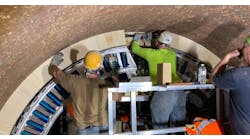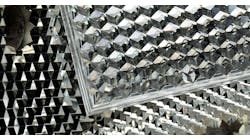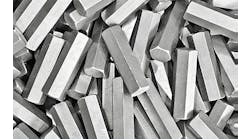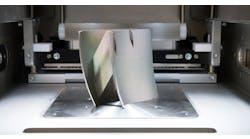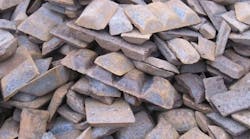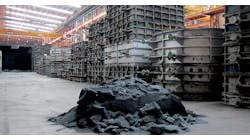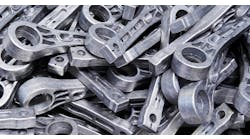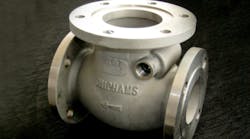Latest from Materials
Good Luck and Good ‘Nite
Could Cold Plasma Change HPDC?
Waupaca Sees Efficiency Gains from New Law
Modeling Aluminum Oxidation
Quiz: Know the Metals!
If any metal can be said to be “hot” it is titanium. Global supplies of the strong-but-light material are forecast to rise this year by 20% to about 150,000 metric tons, following an earlier build-up in new and rehabbed titanium sponge capacity from 2005 to 2008. The global economic collapse in 2008 slowed expansion and plunged titanium demand, but previously scheduled capacity continued to come into production, meaning that producers of titanium products will have something of a price advantage as they respond to reviving demand.
That demand traditionally comes from the aerospace and defense sectors, of course, and those markets are eyed for a rebound in 2011. But, there are lucrative opportunities in energy markets (heat exchangers) and chemical processing and petrochemical refining, too, so it’s not hard to see why expectations are high among producers of titanium products — including castings.
Working to expand the market potential for titanium cast products is Titanium Castings (UK) Ltd. (www.titanium-castings.com), a wholly owned subsidiary of Castings Technology International. Cti specializes at developing new casting technologies and new cast products. TCUK, on the other hand, operates in the commercial arena. It produces fast prototypes, low-volume and series runs, and some specialty castings for critical applications. Titanium castings weighing up to 40 kg are produced, on 5–12 week lead times and with dimensional accuracy conforming to ISO 8062 DCTG 4-7. Casting surfaces have roughness averaging in the range of 2.5-7.6 μm (100-300 μin).
Key elements of TCUK’s production technology are induction skull melting and ceramic shell molding. Induction skull ‘cold crucible’ melting is preferred to vacuum arc re-melting for three principle reasons:
1) At times of high demand, low cost off-cuts of fully certified melting stock is more readily available than the higher cost, pre-alloyed electrodes used in vacuum arc re-melting furnaces; 2) The higher power input ensures that a higher superheat and more uniform metal temperature can be achieved, resulting in the ability to produce castings with very thin walls (<1 mm); and, 3) The stirring action produced by the induction field ensures better homogeneity of alloying elements. TCUK has one 30-kg and one 90-kg melting unit available, and both are able to spin molds for more effective filling.Ceramic shell molds may be made from patterns in wax or other materials, and TCUK is adept at manufacturing very large ceramic shell molds and castings directly from 3D CAD files.
Its quality control capabilities include CMM dimensional inspection and 3D laser scanning for surface geometry certification, to verify compliance with design standards. Laser scanning is used also to set up castings in fixtures to within ± 0.15 mm for CNC machining. The TCUK quality management system complies with the BS EN 9100:2003, AS 9100 Rev B, and BS EN ISO 9001:2000 standards. Radiography and vacuum heat-treatment are certified by NADCAP.
The potential for large titanium castings is demonstrated by the high-integrity, precision components that TCUK has produced for various defense programs. These include parts for BAE Systems’ M777 Lightweight Howitzer; critical components for BAE’s Taranis unmanned combat aerial vehicle demonstrator program; components for the Short Take Off and Vertical Landing (STOVL) variant of the Joint Strike Fighter; and lightweight vehicle armor fittings.
In addition, TCUK is engaged in rapid manufacturing of impellers, diffusers, pump casings and valve parts — all products that benefit from TCUK’s precision manufacturing capabilities and titanium alloys’ lightweight and corrosion-resistant attributes.
Most important for other foundries, the titanium casting manufacturing technologies developed by Castings Technology International and used by TCUK are available under license. The technology transfer includes equipment design and plant layout, equipment supplier selection, and assistance in developing manufacturing strategies and methods for proprietary titanium products. The company also aids its license partners with tooling design and ‘first article inspection’ of castings, training, plant commissioning, and production start-up assistance.
TCUK indicates that two licenses have been granted and have been operating successfully for over two years, and recently it confirmed that a third license program is in progress.

